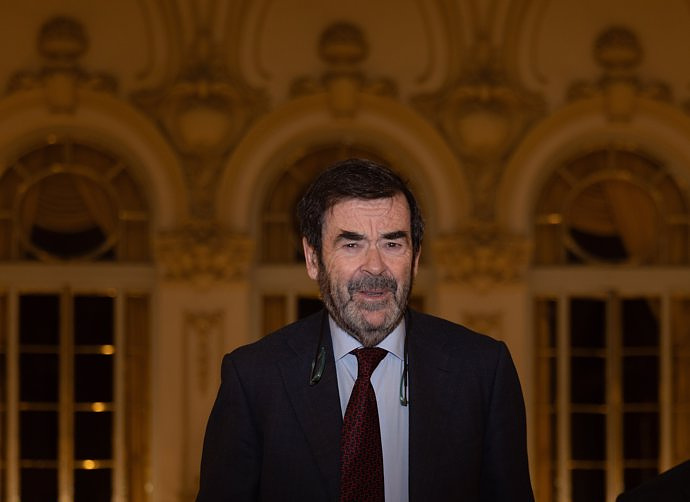The president of the body has chosen to vote blank in the plenary deliberation this Thursday
The General Council of the Judiciary (CGPJ) has endorsed this Thursday the report on the proposed amnesty law drafted by the member of the conservative sector Wenceslao Olea, who defends that the norm is unconstitutional because it violates - among other issues - the separation of powers and the principle of equality.
As reported by the governing body of the judges, the decision was adopted by nine votes in favor, five against and two blank after the Plenary studied two opposing reports on the amnesty at the request of the Senate: that of Olea and that of the member Mar Cabrejas - from the progressive sector -, who maintained that the bill complies with the Magna Carta, although she highlighted the lack of temporal specification and, regarding terrorism, she lacked a definition of what It is considered a violation of human rights.
The Council has specified that the two blank votes have been cast by the interim president of the CGPJ, Vicente Guilarte, and the member Enrique Lucas. The member Mar Cabrejas - rapporteur of the other proposal submitted for debate - will present a dissenting vote, to which the members Roser Bach, Álvaro Cuesta, Clara Martínez de Careaga and Pilar Sepúlveda adhere.
The report that was finally approved this Thursday states that the amnesty bill does not justify its adaptation to the values, principles and conditions of the Constitution. And he defends that none of the current legal precepts, nor the doctrine of the Constitutional Court, nor the jurisprudence of the Supreme Court allow us to conclude that the amnesty is recognized in Spanish Law.
On the other hand, it insists that the proposition undermines the right to equality, since it considers that the basis of the law that could justify discriminatory treatment is insufficient and arbitrary.
Nor does it see it as admissible that the Legislative Branch can nullify the decisions adopted by the courts, except in cases expressly authorized by the Constitution, as is the case with particular pardons agreed by the Executive. For this reason, he concludes that the law also violates the principle of separation of powers.
Regarding the chosen parliamentary procedure, he maintains that it is arbitrary and that its urgency is not motivated. He understands that it does not pass the constitutionality judgment given its nature as a singular law and does not meet the requirement that the causes that motivate it are not arbitrary.
TERRORISM AND IMPLEMENTATION DEADLINES
This report also considers that the bill does not delimit with sufficient and enforceable clarity the objective scope of the amnesty and warns that the wide indeterminacy of the precepts can lead to diverse legal interpretations, causing social criticism about the effectiveness of the amnesty. law concentrates on the judicial bodies.
Likewise, it is imperative to exclude all terrorist crimes from the amnesty and draws attention to the fact that in the section relating to this crime the reference to the Penal Code was eliminated, while at the same time it disgraces that this was done with the intention that the classification contained in national law is not used by Spanish judicial bodies, but directly by the European directive, which means ignoring the nature and form of application of this type of European regulation.
Furthermore, he points out that the automatic and immediate judicial application of the law is very difficult to agree with the speed that is intended - in two months -. He also maintains that the attempt to annul a European arrest warrant when the law comes into force is contrary to EU law.
He defends, in turn, that the approach that consultations with the Constitutional Court or the CJEU do not suspend the procedure does not comply with the current regulation. And, finally, it states that the attribution to the judicial body of the power to declare the amnesty ex officio that is established in the proposition contradicts essential principles of the criminal process.
THE NOVEMBER INSTITUTIONAL DECLARATION
This is not the first time that the CGPJ has spoken out about the amnesty. On November 6, before the PSOE registered the bill and the Senate demanded a report from the governing body of the judges, the members spoke out through an institutional declaration approved by its plenary session.
In that statement, the Council warned that, if a law in this sense was approved, it would mean the "abolition" of the rule of law. This caused an internal division between the conservative and progressive blocs of the CGPJ.
After the PSOE-Junts agreement was announced, the Permanent Commission met urgently to express its "frontal opposition" to the creation of parliamentary commissions to detect cases of alleged 'lawfare' and anticipated that it would act through "legally established channels" if they reached materialize.
Once the bill was registered in the Congress of Deputies, the Permanent Commission met again on December 5 at the request of conservative members, who wanted the executive body to expressly reject the statements of Sánchez and the Minister of Transport, Óscar Bridge, over the 'lawfare'.
However, the Permanent Commission limited itself to ratifying its initial statement on the parliamentary investigation commissions, warning that it would remain "vigilant", something that the conservative members considered insufficient.
This Thursday, the Plenary Session met to debate the two reports that were on the table at the request of the Senate. Since it was a bill, it was not mandatory to obtain their opinion. If it had been a bill, it would have been mandatory.
THE PRONUNCIATION OF BOLAÑOS
The CGPJ has deliberated after the two speakers conveyed their conclusions to the rest of the members on March 12. That same day, the Minister of the Presidency, Justice and Relations with the Cortes, Félix Bolaños, spoke about both reports at the press conference after the Council of Ministers.
Although at first the head of Justice limited himself to saying that the two texts were "different" and with "legal arguments" that he "deeply" respected, later - when the press focused on Olea's report - he assured that the " conservative members" due to "their closeness to the Popular Party" had "no impartiality".
Even though the two texts - to which Europa Press has had access - are opposite, they agree in warning of the temporal indeterminacy of the amnesty law and in raising doubts about the section relating to the crime of terrorism.

 Exploring Cardano: Inner Workings and Advantages of this Cryptocurrency
Exploring Cardano: Inner Workings and Advantages of this Cryptocurrency Seville.- Economy.- Innova.- STSA inaugurates its new painting and sealing hangar in San Pablo, for 18 million
Seville.- Economy.- Innova.- STSA inaugurates its new painting and sealing hangar in San Pablo, for 18 million Innova.- More than 300 volunteers join the Andalucía Compromiso Digital network in one month to facilitate access to ICT
Innova.- More than 300 volunteers join the Andalucía Compromiso Digital network in one month to facilitate access to ICT Innova.-AMP.- Ayesa acquires 51% of Sadiel, which will create new technological engineering products and expand markets
Innova.-AMP.- Ayesa acquires 51% of Sadiel, which will create new technological engineering products and expand markets Khan is re-elected mayor of London and underpins Labor's victory in local elections
Khan is re-elected mayor of London and underpins Labor's victory in local elections Felipe VI swears the flag again 40 years later at the AGM with Princess Leonor as a witness
Felipe VI swears the flag again 40 years later at the AGM with Princess Leonor as a witness Freixenet and unions agree to reduce working hours by 20-50% this year due to the drought
Freixenet and unions agree to reduce working hours by 20-50% this year due to the drought STATEMENT: Nearly 400 people participate in the II Family Support Conference at UIC Barcelona
STATEMENT: Nearly 400 people participate in the II Family Support Conference at UIC Barcelona How Blockchain in being used to shape the future
How Blockchain in being used to shape the future Not just BTC and ETH: Here Are Some More Interesting Coins Worth Focusing on
Not just BTC and ETH: Here Are Some More Interesting Coins Worth Focusing on A sensor system obtains the fingerprint of essential oils and detects if they have been adulterated
A sensor system obtains the fingerprint of essential oils and detects if they have been adulterated Faraday UPV presents the 'Origin' rocket to exceed 10 km of flight: "It is the beginning of the journey to space"
Faraday UPV presents the 'Origin' rocket to exceed 10 km of flight: "It is the beginning of the journey to space" The Generalitat calls for aid worth 4 million to promote innovation projects in municipalities
The Generalitat calls for aid worth 4 million to promote innovation projects in municipalities UPV students design an app that helps improve the ventilation of homes in the face of high temperatures
UPV students design an app that helps improve the ventilation of homes in the face of high temperatures A million people demonstrate in France against Macron's pension reform
A million people demonstrate in France against Macron's pension reform Russia launches several missiles against "critical infrastructure" in the city of Zaporizhia
Russia launches several missiles against "critical infrastructure" in the city of Zaporizhia A "procession" remembers the dead of the Calabria shipwreck as bodies continue to wash up on the shore
A "procession" remembers the dead of the Calabria shipwreck as bodies continue to wash up on the shore Prison sentences handed down for three prominent Hong Kong pro-democracy activists
Prison sentences handed down for three prominent Hong Kong pro-democracy activists ETH continues to leave trading platforms, Ethereum balance on exchanges lowest in 3 years
ETH continues to leave trading platforms, Ethereum balance on exchanges lowest in 3 years Investors invest $450 million in Consensys, Ethereum incubator now valued at $7 billion
Investors invest $450 million in Consensys, Ethereum incubator now valued at $7 billion Alchemy Integrates Ethereum L2 Product Starknet to Enhance Web3 Scalability at a Price 100x Lower Than L1 Fees
Alchemy Integrates Ethereum L2 Product Starknet to Enhance Web3 Scalability at a Price 100x Lower Than L1 Fees Mining Report: Bitcoin's Electricity Consumption Declines by 25% in Q1 2022
Mining Report: Bitcoin's Electricity Consumption Declines by 25% in Q1 2022 Oil-to-Bitcoin Mining Firm Crusoe Energy Systems Raised $505 Million
Oil-to-Bitcoin Mining Firm Crusoe Energy Systems Raised $505 Million Microbt reveals the latest Bitcoin mining rigs -- Machines produce up to 126 TH/s with custom 5nm chip design
Microbt reveals the latest Bitcoin mining rigs -- Machines produce up to 126 TH/s with custom 5nm chip design Bitcoin's Mining Difficulty Hits a Lifetime High, With More Than 90% of BTC Supply Issued
Bitcoin's Mining Difficulty Hits a Lifetime High, With More Than 90% of BTC Supply Issued The Biggest Movers are Near, EOS, and RUNE during Friday's Selloff
The Biggest Movers are Near, EOS, and RUNE during Friday's Selloff Global Markets Spooked by a Hawkish Fed and Covid, Stocks and Crypto Gain After Musk Buys Twitter
Global Markets Spooked by a Hawkish Fed and Covid, Stocks and Crypto Gain After Musk Buys Twitter Bitso to offset carbon emissions from the Trading Platform's ERC20, ETH, and BTC Transactions
Bitso to offset carbon emissions from the Trading Platform's ERC20, ETH, and BTC Transactions Draftkings Announces 2022 College Hoops NFT Selection for March Madness
Draftkings Announces 2022 College Hoops NFT Selection for March Madness
























